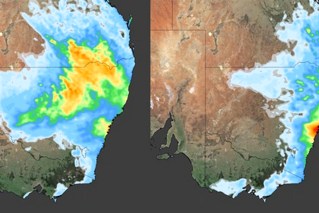An expert has warned that unless there is greater international collaboration, space debris – like what was seen in Melbourne’s skies on Tuesday morning – could interfere with commercial flights “within five years”.
Onlookers witnessed the debris from the second stage of a Russian rocket, launched in Moscow to put a navigational satellite into orbit, streak through the night sky as it broke up in the atmosphere.
Debris from satellite and rocket launches previously closed French and Spanish airspace in 2022 after a Chinese rocket body re-entered the atmosphere in uncontrolled free fall.
Professor Alice Gorman, a leading space archaeologist and associate professor at Flinders University, said most rocket debris returning to Earth went unnoticed.
Tweet from @markjdavidson
“They try to get most to fall back into the ocean, without such a spectacular fireworks display,” Professor Gorman said.
“What was different about this one was the re-entry pass was over Melbourne, with lots of people around to see it and it was at night, so the burning up in the atmosphere was very visible.”
Dr Jason Held, a retired major with the US Space Command and founder of Saber Astronautics, told The New Daily that close calls involving debris happen “every day” in both the government and civil space industry.
“Governments are aware of these things, but it’s hard to get them to talk together and it really is a problem,” he said.
“A lot of them think they can rely on the United States military and North American Aerospace Defence Command (NORAD), which normally tracks these things, but they’ve already shown that civil space traffic is not their problem.
“Most governments are not yet collaborating, and they have limited time to do so.
“I predict within five years they’re going to have to have their systems up and running before it becomes extremely difficult to do day-to-day commercial flights as well as government flights.”
Houston, we have a problem
Associate Professor Michael Brown, from the School of Physics and Astronomy at Monash University, said the amount of debris in the Earth’s atmosphere is “increasing pretty rapidly up there”.
“For instance, there is a rocket launch into orbit pretty much every week and they’re launching a lot of satellites,” he said.
“When those satellites stop working, they eventually come down, but if they’re not functioning, there’s no way to control them.”
He said some countries are better than others at looking after their space junk, but without any form of international agreement or oversight, space debris will continue to be an issue.
“There have been some examples of large space junk coming down in an uncontrolled manner, particularly some pieces of Chinese space junk that have been up in orbit for a few weeks and come down fairly randomly,” Dr Brown said.
“It can definitely be managed, it just needs goodwill and co-operation for that to happen. At the moment, we aren’t really there.”
The United Nations has a Committee on the Peaceful Uses of Outer Space, where countries and organisations share research and information on space debris, but there are no international agreements governing the management of the issue.
Professor Gorman said the lack of action is a “reflection of government irresponsibility around the world”.
“Something that makes people react badly might be what it takes for them to get off their arses and take some more serious action,” she said.
“There are a lot of organisations across the world who are working hard on these problems and there’s a lot of good intentions, but sometimes that isn’t enough.”
The European Space Agency states that with 70 to 90 launches a year, and an increasing number of commercial launches injecting 30 or more satellites into orbit at once, the most effective solution for reducing space debris is restricting in-orbit explosions and robust compliance with post-mission disposal guidelines.
Growing risk
Professor Gorman said there is international consensus “that there is a problem and something needs to be done, but not on what that might be”.
“SpaceX has got Starlink kicked off and there are at least two or three other plans for these mega constellations as well, so we’re duplicating services,” she said.
“We’re creating more launches, more space junk and there is no indication of an international desire to say we maybe shouldn’t do that.”

The European Space Agency estimates there are between 60 and 90 launches a year. Photo: AAP
The global space industry is now worth over $680 billion and could grow past $1 trillion by 2030.
Dr Held said he doesn’t necessarily see the launch of overlapping services as an issue, and the onus is on governments to collectively handle space debris.
“What we are seeing now is the normal evolution and maturation of the space industry,” he said.
“Governments need to collaborate. They need to set up common standards of data sharing and systems at the unclassified civilian level to manage this safety of flight problem.”









